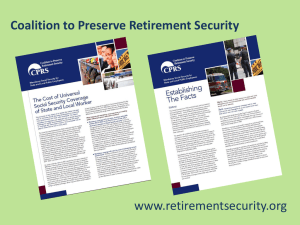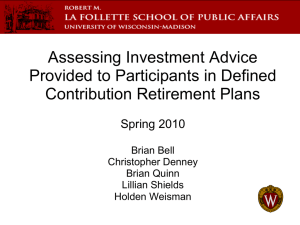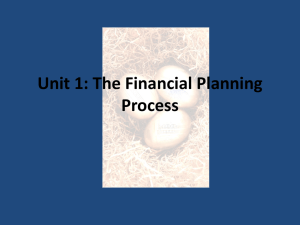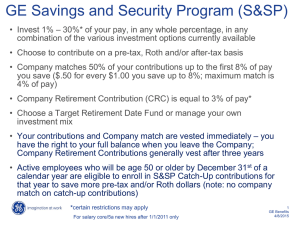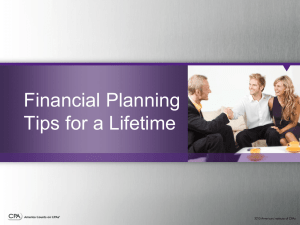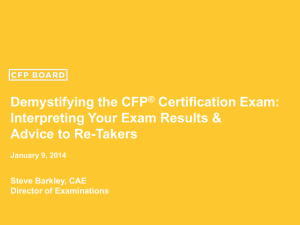Retirement! - Lawyers Assistance Program of British Columbia
advertisement
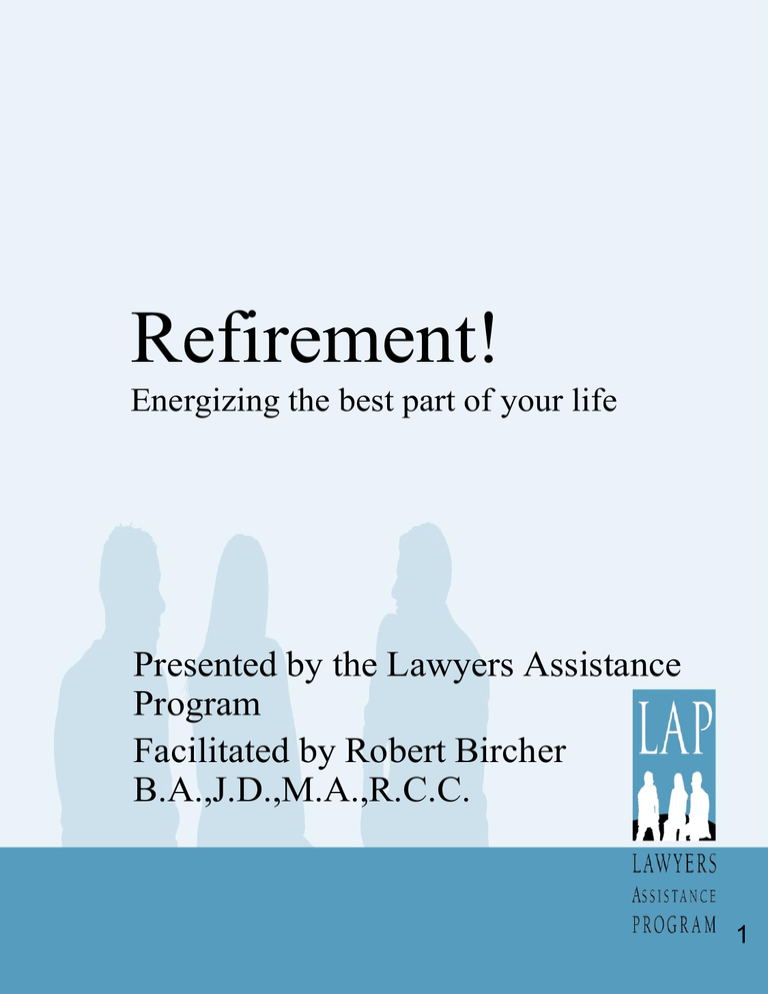
Refirement! Energizing the best part of your life Presented by the Lawyers Assistance Program Facilitated by Robert Bircher B.A.,J.D.,M.A.,R.C.C. 1 Past Models of Retirement no Longer Applicable • Previous role models i.e. what our parents did are unlikely to be followed by this generation • Boomers will pave the way for a new style of retirement • Preparation for a happy retirement involves more than simply making sure you have enough money • There are also the dimensions of physical and mental health as well as social and psychological factors 2 Increased Longevity • Average life expectancy was 22 years in Roman times,47 at the turn of the 19th century, during most of human history only I in 10 people survived to 65-old age is a fairly recent phenomenon • If you make it to 65 you have an average of 17 years for men and 21 years for women (Statistics Canada) • Not only are we living longer, we are healthier longer than ever 3 Extended good health • We are entering or experiencing physiological old age later in life • The extra 20 or 30 years we have gained have been added to the middle of life not to the end • The period between what was formerly the end of middle age (roughly 50) and what is the beginning of real physical old age (after 75) is a new stage in adult lifeone that has never existed before as a generalized experience for large numbers of people • The average 65 year old today is functioning mentally and physically at the level that our parents generation did at 50 4 Aging Well and the Psychology of Transition • If you thought getting into law was hard wait till you try getting out! This module is about Aging well, the psychology of transition and letting go of “I am a lawyer” • “Old age is a privilege denied to many” • You are not a lawyer-you never were-that is a role you took on in your twenties and most of you will exit that role in the next decade • “Removing your robes” is your next major metaphorical task 5 Retirement-Not as easy as it looks! • 5 myths of retirement 1. If retirement isn’t here yet, you don’t need to think about it 2. Retirement is easy; you just stop working 3. Retirement will be a permanent vacation 4. If you have enough money to retire, that’s all you need to worry about 5. You are going to love spending all that extra time with your spouse 6 Not your Daddy’s Retirement • Retirement has changed since our fathers retired-an abrupt stop at 65 is no longer the norm • Many lawyers move on to different careers, or gradually slow down • Lawyers in particular do not turn their back on work for a life of leisure • The Oregon retirement survey shows that many lawyers will practice well beyond 65 with 40% planning to practice after age 70 and 11% planning never to retire at all! • For some that is because of economic necessity, for others it is for the stimulation, sense of purpose and satisfaction it provides • 71% see retirement as time to begin a new chapter in life 7 Transition to Retirement • Transition is a normal part of life, but major transitions set in motion a period of psychological and emotional adjustment • In addition to the expected health and financial issues we can expect change, losses discomfort and disorientation-11 out of 43 in terms of being one of life's most stressful events • See transition curve chart • Whether you retire by choice or are forced out makes a big difference – voluntary retirees report much higher satisfaction 8 Losses in Retirement • Earned Income-the end of a regular paycheque comes with some anxiety-can we make it on our savings? Few lawyers in private practice can count on a defined benefit pension-most small firms have none • Loss of structure-in law you don’t have to worry about how to spend your day-without this some retired lawyers experience an uncomfortable loss of focus and direction • Those who have not developed regularly scheduled activities-contract work, volunteering, hobbies, educational outlets can experience great stress • Some lawyers have so much trouble with this that they are unable to retire 9 Losses in Retirement • Research and anecdotal experience show that it is much better to begin to start new activities, classes and hobbies before you retire, since many people do not do this after retirement • Lawyers that have reduced their life to work will have a hard time finding new interest( buried in the rubble of duty, obligation and fear of trying something new) • Loss of intellectual stimulation-Lawyers are well educated and most are intellectuals, doing a crossword puzzle isn’t going to cut it-most lawyers want something more substantial to sink their teeth into 1 0 Losses in Retirement • Loss of feeling useful and valuedmost lawyers are actually closet “helpers”-in retirement this lack of acknowledgement is usually missed • Loss of social and professional network-the loss of regular contact with coworkers and colleagues • If lawyers don’t broaden their social network prior to retiringretirement will result in feeling far less connected 1 1 Losses in Retirement • The harsh reality is that many friends and acquaintances are situational-when you leave work that “friendship” is over • Leisure Paradox-for an activity to be “leisure” it must be a diversion: a vacation, a break etc.-if it becomes our main focus it is no longer leisure! • Too much leisure and it ceases to provide the pleasure and restoration it is intended to provide 1 2 Loss of Identity • Some lawyers actually have the role of “lawyer” as their main identity-rather than a role they have for a while in their lives • The problem with identifying with your occupation is that you close your mind to your non law interests and passions. You forget how to explore theses other parts of yourself • The experience can be like going from being “somebody” to being “nobody” 1 3 Changes in Relationships in Retirement • Your network of relationships will change in retirement, including with your partner, children, extended family, friends, former colleagues etc, • Your wife may experience “twice the husband for half of the income” • Use of space in your home may change when you are around more often • Your children's view of your retirement (free babysitting)may be very different than your own(glad to be free of my children) 1 4 Impact of Retirement on Couples • Much research shows that “the retirement transition itself is related to decreased marital satisfaction and increased marital conflict” • The good news is that once the retirement transition becomes the new status quo (after about 2 years) marital satisfaction increases • Often good conflict resolution skills will predict how well a couple does 1 5 Life Satisfaction and Friendship • Research shows that the most powerful predictor of life satisfaction after retirement is the size of a persons social network • Many lawyers let their circle of friendships suffer as a consequence of practicing law-this grievous error will cost them dearly in retirementunless they actively learn to make new friends • Socially active people live 2.5 years longer than people who are not socially active 1 6 Fears and Dreams in Retirement for Women • Women’s fears often include-fear of losing their identity, being responsible for their partners social life and entertainment, (twice the husband for half the money) experiencing a disruption of established patterns, needing to take care of everyone, financial and health issues, outliving their spouse • Women’s dreams often include returning to school, becoming an entrepreneur, meaningful volunteering, renewing relationships and enjoying life 1 7 Fears and Dreams in Retirement for Men • Men's concerns include lack of status, lack of social support, lack of purpose, declining physical abilities, poor communication with significant others and “failure to launch” kids • Men’s dreams include an active lifestyle, getting in shape, reviving romance with spouse, involvement with grandchildren, and developing new skills • Both genders also wish for more travel• Good news-60% of couples report an improvement in the marriage 2 years after retirement! 1 8 OAAP Retirement Survey • 71% envision retirement as a time to begin a new chapter in life by being active and involved, starting new activities, and setting new goals • 29% envision retirement as a time to take it easy, take care of themselves & enjoy leisure • Bottom line-few lawyers will actually quit suddenly at age 65: many lawyers will still be working at least part time at age 70!! 1 9 Imagining your Retirement • Some may want to simply walk away completely and forever • Some will want to phase out gradually • Some may work part time or work as a consultant or independent contractor • Some may have to work out of necessity • Some may retire for a while, then get back into law or some other occupation or start a business 2 0 Participatory ExercisesExercise #1 • What is Your Personal definition of retirement? • What are Your Personal hopes and dreams about retirement? • What are Your Personal concerns and fears about retirement? • Take 5 minutes and write an answer to these questions-then introduce yourself and share these with your table 2 1 Physical Health • Only about 30% of the characteristics of aging are genetically based; the rest-70%are not-people are largely responsible for their own old age • Only about 21% of people over 65 have a chronic disability that impairs activity to some degree • Doctors believe about 70% of all chronic diseases, including heart disease and diabetes can be warded off with timely sensible changes in lifestyle 2 2 Health Factors • Obvious changes include stopping smoking, exercise, nutrition and weight control • A rewarding social network and stable relationships are so important we are devoting an entire module to it. • Exercise is even more important as we age, inactivity combined with obesity is a sentence for an early death 2 3 Health Factors • Walking 30 minutes, six times a month reduces the death rate by 43% in older adults • Walking also reduces the risk of heart disease and stroke by 40% • Exercise plans should include components of aerobics, weights and stretching • Retirement plan#1-get in shape stay in shape-start now 2 4 Cognitive Functioning • Lawyers are by nature thinkers and highly value their cognitive functioning-will this decline as we age? • The old myth was that mental decline was inevitable and that neurons die as we age • New research shows that our brains are constantly reorganizing (neuroplasticity) and this process speeds up with the amount and complexity of new information the brain receives 2 5 Cognitive Functioning • Stimulated brain cells branch frequently, with the result that millions of new connections are created and your brain becomes larger • This means that our brains actually grow when stimulated by new material (material that is unfamiliar to you) • Examples are learning a new language, learning to dance or paint etc. 2 6 A Sense of Purpose in Retirement • Old age is like everything else, to make a success of it, you’ve got to start young. • You need a plan about what you are going to do and be in retirement • People who count on developing new interests, activities and involvements after age 65 and after retirement often don’t • Polls show retired people spend half their free time watching TV 2 7 Transition to Retirement • “Transition” can be defined as ones psychological reorientation to changes in life • Life can be seen as a wave of expansion and contraction rather than a linear endless upward progression • In eastern cultures age is revered in western cultures it is reviled or seen as a “problem” • It is a time of less interest in performance and doing and more interest in meaning and being 2 8 Transition to Retirement • It can be a time of the realization that you will never be, do, or have some things you dreamed of • More importantly, it is also a time when you realize that “chasing the carrot” never will give you the sense of fulfillment you thought it would • For some people letting go of “trying to make it’ creates space for you to do what you were really meant to do 2 9 Transition to Retirement • Gandhi (a lawyer) discovered at 50 his mission of non violent resistance • Cervantes did not begin his career as a novelist until well past 50 • I believe Boomers will do amazing things in retirement-some of us may do our best or most valuable achievements in the last third of our life • William Bridges in his book Transitions explains the phenomenon of transition well • He describes 3 stages, comprised of an ending, a neutral zone and a new beginning 3 0 Transitions • The transition out of “I am a Lawyer” tends to be subtle but profound at the same time. • Those Lawyers who have made the shift sometimes find it much more difficult than they expected even those who didn’t particularly like being a lawyer in the first place • It is an experience of loss of being “important” in the eyes of the world 3 1 Transitions-Endings • Disengagement- separation from the old role or setting • Disidentification-not sure of who you are anymore • Disenchantment-one’s world no longer fits that old or prior reality • Disorientation-feeling lost, confused, empty 3 2 Neutral Zone • Gap between who you used to be and who you are going to be • Symbolically a desert, a time of inner reorientation • In traditional societies this was handled well-People were taught to chant and fast, and remove themselves from society- “a walkabout” 3 3 Neutral Zone • Our culture does not honor such experiences • Requires surrender and giving in to the emptiness, not trying to escape it • It is a time of anxiety and we may feel detached or isolated 3 4 New Beginning • Attraction to an idea, an impression, an opportunity, a dream, an image • Self doubt is common here • A process of reintegration, a rebirth into a new reality • If you allow it to occur rather than resist it, it will result in new energy and motivation 3 5 Transition Tips • Take your time-it is a psychological process and cannot be rushed • You may need to make short term or temporary arrangements • Expect fear, uncertainty, confusion and doubt-it is usually not a “pretty” process • A good support system is crucial here 3 6 Transition Tips • Those who have had a life of transitions (job/career changes, divorces and remarriages, big health challenges, large gains or losses of money) or those who have already left law will have an easier time of it than those who have had fewer changes • In my experience of those who have left law (voluntarily or otherwise) at first almost all have some difficulty in seeing themselves doing something else-but when that “letting go” has happened a whole new world opens up 3 7 Transition Exercise-Developing a Sense of Purpose • Exercise #3- What activities do I anticipate being involved in after retirement-what do I need to do now to create this? • Example: I want to paint landscapes and portraits when I retire-I need to take a watercolor class now! • I want to be a good dancer-I need to take dance lessons now! • Share these with your group • Research indicates you are unlikely to start new activities when you actually retire-you need to start now! 3 8 Wheel of refirement Life • “Wheel of Refirement Life” exercise • On a scale of 1-10 draw a line where you are now in these dimensions of your lifeline A • Draw a second line of where you would like to be when you retire-line B • The gap (if any) represents what you need to do or change NOW to get from A to B • These are the action steps required to make your retirement work out well • What changes do I need to make?complete at least 2 of these now 3 9 What is So Great about Retirement? • The OAAP survey shows that retired lawyers over 50 most enjoy the following opportunities: • More time and opportunity to travel • Increased control over their schedule • Time for community service, volunteering, hobbies, recreation, education • More time for family and friends • More time for exercise and fitness • A slower pace • Decrease in adversarial relationships 4 0 Aging Well-Harvard Study • Based on the Study of Adult Development at Harvard University-the longest study of aging in the world • Predictor factors of successful aging: • Not smoking or stopping before 50 • Adaptive coping style (positive outlook on life) • Absence of alcohol abuse • Stable marriage 4 1 Aging Well • Regular physical exercise • Not being overweight • If you have 5 or more of these predictor factors at age 50 Good news-you have an excellent chance of being healthy and happy (and alive) at 80 • If you have 2 or less at age 50- Good news-you won’t have to worry about old age-my advice? Quit practicing now, take your OAP now, continue partying, smoking, drinking and eating for the rest of your (short) life 4 2 Aging Well-Cohen Study • 21st Century Retirement survey by Cohen-Major Findings • Not having a retirement planning program undermines the quality of the retirement experience • Prospective retirees should focus as much on developing a balanced social portfolio as they do on a balanced financial portfolio • Retirees want to be more engaged in their communities –not less-get involved! 4 3 Aging Well • Retirees report a limited number of new friends and even fewer new close friends-get social! • The single most important question for influencing thinking about retirement is “what gives you a sense of purpose in life?”The almost universal response is “making a contribution toward helping others” • Retirement is not all or nothingmany retirees work and retire together! 4 4 Completion of Retirement Vision-Presentation • Complete your retirement vision exercise-taking into account all you have learned today • Note any parts of it that you may have doubts will actually happendiscuss with your group what would it take for there to be no doubt about it • Get behind your own visionenergize it-by standing and telling all of us what it is in an enthusiastic way 4 5 Great Books • Aging Well-by George Vaillant, M.D.-A book about how to age successfully • Age Power- by Ken Dychtwald-A book about how boomers will reshape the meaning of aging • Lawyers at Midlife –by Michael Long-a retirement book specifically directed at lawyers • The Retirement Time Bomb- by Pape-a detailed book about financial planning for Boomers 4 6

